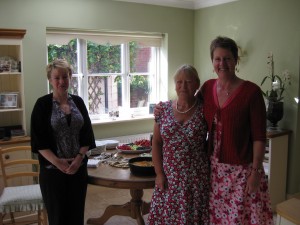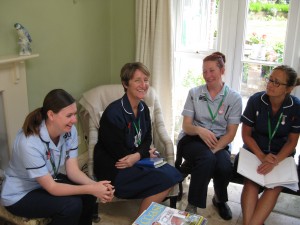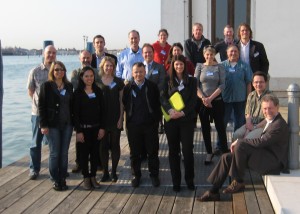Bournemouth University hosted a creative and digital economy summit at the EBC on Friday 7 June where leading businesses, entrepreneurs and MPs came together to back a bid to style Bournemouth, Poole and Christchurch as a hub for the creative and digital industry. A manifesto, coordinated by BU with input from a range of local stakeholders, was launched at the event and a host of different businesses and organisations pledged to commit money or their expertise with the aim of growing the local creative and digital sector in the hope the area. The summit featured in the Daily Echo on June 12 which reported that “the area already has above average business start-up and survival rates and is one of the UK’s liveliest digital clusters and this exciting development is a great step forwards”. Read more here. BU will continue to play a central role in taking forward the work set out in the manifesto so watch this space for further developments. If you are interested in finding out more, contact Samantha Leahy-Harland on sleahyharland@bournemouth.ac.uk
Tagged / collaboration
What the FIF’s it all about? – Another drop-in session today!
 Couldn’t get to the drop-in session on Talbot yesterday? Don’t panic! We’re holding another one today at Lansdowne.
Couldn’t get to the drop-in session on Talbot yesterday? Don’t panic! We’re holding another one today at Lansdowne.
Do you have questions about a potential bid for Fusion funding? Don’t know which strand to apply to? Not sure if your idea is eligible? Need more information about Erasmus? Come along to our drop-in session TODAY to get your questions answeredand to find out more about the Fusion Investment Fund (FIF):
TODAY 1-2pm, EB702, EBC, Lansdowne Campus
The Fusion Investment Fund is managed by Samantha Leahy-Harland and is administered by Natalie Baines and we’ll be there along with Moritz Ehlen, BU’s International Mobility Officer, who can provide specific guidance with regards to Erasmus.
There are some fantastic opportunities available under the 3 strands of the FIF and we’re looking forward to receiving lots of really good quality applications in time for the deadline of 1 July. We look forward to seeing you later!
More information about the different strands of the Fund on the Staff Intranet pages.
Please direct all initial enquiries to Natalie Baines.
Dizzy the dog attends midwives forum

Left to Right: Mandy Williams - Community Midwife, Gay Rogers - Breakfast Host and Hospital Midwife and Luisa Cescutti-Butler, Senior Lecturer (Midwifery)
Every three months hospital and community midwives at Salisbury NHS Trust Hospital attend a forum dedicated to matters relating to Examination of the Newborn (EXON). The aims of the forum are to support healthcare professional undertaking newborn examinations, sharing of experiences/case studies, interprofessional working, maintenance of competence, formulate and review internal processes and peer support for professionals in training. Members consist of midwives, nurses, a consultant Paediatrician and Children’s physiotherapists. BU student midwives are welcome to attend when working with their community midwives and on this occasion two students were present. As unit leader for EXON at BU and one of the link lecturers at the hospital, I chair, coordinate and facilitate the forums, with venues alternating between hospital and community. This month we met for breakfast at a colleague’s home, where midwives were greeted with the smells of freshly brewed coffee and a newly prepared home cooked frittata. Further offerings included fresh strawberries, raspberries, warm croissants, cocktail sausages and quails eggs.
Minutes and agendas are sent out in advance. A standing item is a report from senior children’s physiotherapist Karen Robinson, whose department leads the service for Developmental Dysplasia of the Hips (DDH) in newborns. A recent case was brought to our attention, where a baby had been examined by midwives and doctors and found to have an unstable right hip. The baby was appropriately referred for an ultrasound scan which subsequently found the right hip normal, but considered the left hip abnormal. The Barlow’s and Ortolani manoeuvres used by both professions at the time of the examination had not detected any left hip abnormality. A robust discussion ensured as to the complexities of examining babies for DDH and the difficulties in detecting unstable hips when the manoeuvres used by all professionals were themselves unreliable. However Karen was able to reassure us by indicating that in the seven years of the Children’s Physiotherapy Department leading the DDH service, very few babies had been ‘missed’. Karen also emphasized the significance of caring for babies’ hips in general and the importance of educating parents around their baby’s ‘hip health’. The 3rd year midwifery students are currently taught theory around DDH with opportunities to practice manoeuvres on ‘Baby Hippy’. As facilitator for these sessions I realized that our midwifery curriculum had to include general baby hip health in the first year of the student’s programme. Rachael, a 3rd year student midwife, was in agreement: “the discussion around hip care for newborns was great to listen to. I agree that it would be really beneficial to have a lecture on hip care for students”.

Left to Right: Rachael Callan - 3rd year student midwife, Carol Bremner - Community Midwife, Beccy Seaton-Harris - 1st year student midwife and Fiona White - Community Midwife
On other matters Karen highlighted a number of babies diagnosed with Erb’s Palsy following birth had recently been treated by the department. Various options were offered as to why these babies had sustained these birth injuries, resulting in the forum unanimously agreeing that education around Erb’s Palsy and Brachial Plexus Injuries would benefit all professionals involved with childbirth. Terri Coates, an expert on Brachial Plexus Injuries and a midwife at Salisbury, agreed to arrange a study day with the national Erb’s Palsy Support Group, to be held at either Salisbury Hospital or BU for midwives and students.
There are many advantages in having a regular forum to discuss issues relating to newborn examination. Case studies are presented and debated and education around various topics are provided at regular intervals. The forum also supports midwives from other trusts who are having difficulties with undertaking the examination in their areas. Beccy, the 1st year student midwife had the following to say: “It was very informative. It was good to see community and hospital midwives coming together as a team. I am also interested in learning more about Erb’s Palsy and attending a study day. Learning about general hip care would also be beneficial. The breakfast was lovely too”.
The last bark, I mean word, goes to Dizzy. He gets terribly excited when breakfast is served and runs from one midwife to another hoping for a dropped sausage or at least a titbit from a kind soul. After not having much luck, he eventually settles down and gently snores in the corner of the room.
Hello from the new Clinical Research Co-ordinator!
My name is Lisa Gale and I am the new Clinical Research Co-ordinator in Bournemouth University’s Clinical Research Unit (BUCRU). I would like to take this opportunity to introduce myself and explain a little about my role.
The main focus of my role is to create a seamless link between academics at BU and clinicians in the NHS who are interested in interprofessional, high quality research to construct bids for funding, develop project plans, and conduct research. I will work with researchers across all six Schools at BU and in the health service, with a view to identifying novel collaborations and supporting the development of projects into grant applications.The role supports BU’s key concept of fusion through creating local, regional, national and international partnerships and academic networks, undertaking world-class research, and inspiring staff to realise their full potential and enrich the world.
My passion for research developed whilst studying psychology at Cardiff University. For the past several years, I have worked in the research department of a local NHS Trust that provides mental health and community services. I have experience in co-ordinating NHS grant applications, designing, costing and delivering research projects. My background is mainly in psychology and mental health, so I am excited at the opportunity to become involved in high quality research in other areas of healthcare.
The Clinical Research Co-ordinator role is new, and over the coming weeks and months I will be visiting many departments at BU and in local NHS Trusts to discuss how the role can best support academics and clinicians alike. I look forward to meeting as many of you as possible in this time, but please feel free to contact me should you have any questions or queries, and especially if you have a novel and exciting research idea! You can contact me by email at lgale@bournemouth.ac.uk or by phone on 01202 962172.
More information about the support that BUCRU and CoPMRE can offer researchers is available through the following links:
Bournemouth University Clinical Research Unit (BUCRU) Annual Report

At the Bournemouth University Clinical Research Unit (BUCRU) we think it is important to review our activities on a regular basis, to document our achievements and to outline our plans for the future. We have decided that the best way to do this is to prepare an Annual Report. It was completed some months ago and now we would like to share it more widely with our colleagues in the University. It can be found on our microsite at http://microsites.bournemouth.ac.uk/bucru/news/ we hope it is of interest.
The support and collaborations we offer are available to staff within the University, and to staff in the NHS. In the next year we will be particularly trying to develop new collaborations between University and health service staff that will lead to high quality grant applications.
If you would like further information please contact Louise Ward (wardl@bournemouth.ac.uk Tel: 01202 961939)
Presentation from Paula Kersten ‘Supporting strategies for self-management of rehabilitation in the home: a feasibility study’

You are cordially invited to a lunchtime presentation being delivered by Paula Kersten the Associate Professor of Rehabilitation at Auckland University of Technology and Visiting Professor with HSC. This is an hour long presentation entitled ‘Supporting strategies for self-management of rehabilitation in the home: a feasibility study’. This talk would be of interest to health professionals working in health and rehabilitation. We very much hope you will be able to attend this informative presentation.
For Paula Kersten’s Biography, please follow link below:
http://www.aut.ac.nz/profiles/paula-kersten
Thursday 16th May 2013
‘Supporting strategies for self-management of rehabilitation in the home: a feasibility study’
Presentation by Paula Kersten, Associate Professor Rehabilitation, Auckland University of Technology
12.00-1.00pm
BG11, Bournemouth House, Lansdowne Campus, BH1 3LH
Hosted by Clinical Research Unit
European Science Foundation and Global Changes in the Marine Environment
I was very proud to have been invited by the Institute of Marine Sciences – National Research Council (ISMAR-CNR) in Venice who developed on the European Science Foundation Platform, the Exploratory Workshop: Marine woodborers: New Frontiers for European Waters. And I have to say that that was one of the most exciting research opportunities I have taken part of in the recent past.
The European Science Foundation (ESF) was established in 1974 to provide a common platform for its Member Organisations to advance European research collaboration and explore new directions for research. Currently it is an independent organisation, owned by 67 Member Organisations, which are research funding organisations, research performing organisations and academies from 29 countries.
The focus of the Exploratory Workshops scheme is on workshops aiming to explore an emerging and/or innovative field of research or research infrastructure, also of interdisciplinary character. Workshops are expected to open up new directions in research or new domains. It is expected that a workshop shall conclude with plans for follow-up research activities and/or collaborative actions or other specific outputs at international level.
The organisers, namely Davide Tagliapietra, Erica Keppel and Marco Sigovini – all from the ISMAR-CNR- did an amazing job in organising this much needed research group and by planning an excellent working programme.
The topic, centred on Marine woodborers is of utmost important as these organisms are a threat to maritime structure and archaeological heritage. Recently, an increase in attack and a northward spread has been reported. Despite the ecological, economical and cultural importance, research on this subject is carried out by few scientists scattered across Europe. An interdisciplinary approach is needed to reach a synthesis of knowledge and a deeper understanding of the causal factors. The main outcome of the workshop is the establishment of a research network aiming to coordinate scientists with an European perspective and a global view. Through the establishment of such a network, new theoretical and technical developments could be achieved.
The agenda of the workshop was to focus on:
1) bringing together experts in complementary fields that have hitherto not collaborated as a group;
2) identifying additional research competences that are not covered within the group of participants;
3) identifying, exchanging and sharing research interests for future joint leading research projects and developing an application strategies;
4) the establishment of an international network on marine woodborers.
Despite the subject ([wood-]‘boring’ organisms), there wasn’t a single dull moment. It was very exciting to spent a considerable amount of time with international peers coming from as far as Colombia and discussing the problems surrounding these particular organisms.
All sessions were extremely interesting and productive and I totally enjoyed chairing one of them in the Knowledge Café, with my hat of maritime archaeologist whose research interest based also based on marine organisms and global changes, but I am also one of few who combines degradation and protection of the cultural heritage and marine science. The Knowledge Café focussed on Systematics and biogeography, Marine woodborer-microorganism interactions, Protection of shipwrecks and maritime structures. Each group discussed weaknesses: Problems, constrains and bottlenecks, Strengths: Opportunities, synergies, and Perspectives: Solutions, actions and recommendations.
19 international peers attended, which was by invitation only, this amazing opportunity, some of which were old friends and some of which have become reference points for my current and future research on wood borers.
All with the amazing architectural beauties of a tiny Venetian island just in front of one of the world most famous squares: San Marco square!
Fused Bones: bringing students and osteo-archaeology together
 Archaeologists from the School of Applied Sciences have been awarded a Staff Mobility grant from the Fusion Investment Fund as part of the SMN Strand Santander Scholarships to develop a link with the Department of Archaeology at St Petersburg State University in Russia.
Archaeologists from the School of Applied Sciences have been awarded a Staff Mobility grant from the Fusion Investment Fund as part of the SMN Strand Santander Scholarships to develop a link with the Department of Archaeology at St Petersburg State University in Russia.
The aim of this proposal is to establish a collaborative, international project between BU and St Petersburg State University based on shared interests in the area of archaeology, with specific reference to osteoarchaeology. Building upon previous contacts established with Russian colleagues, the project that emerges from this proposal will aim to link students (from both SPSU and BU) and research-active staff (again from both institutions) in such a way that will allow student placements to be developed and funding identified and applied for that will support research and student participation.
Research into how people have used and treated domestic and wild animals over time has been one that the School of Applied Sciences has been pioneering for many years and will form the basis for this collaboration. This includes how people regarded animals within a cultural context as well as how human impact has affected animal populations (e.g. the decimation of the beaver population within NW Russia in the late medieval period). This project will bring together issues of biodiversity and environmental change within a study of how past societies have viewed certain animals within their culture.
The proposal is to use this summer as the opportunity to develop a specific project with our Russian colleagues, designing it and its methodology, identifying funding sources, and agreeing to collaborate in such a way as to involve students in the project.
The resulting project will deliver a clear contribution to Fusion by linking research, student placements, and teaching and learning for both undergraduates and post graduates within the School of Applied Sciences.
For further information please contact either Dr Mark Maltby (mmaltby@bmth.ac.uk)or Professor Mark Brisbane (mbrisbane@bmth.ac.uk).
Networking with microbes: BOSS – Biogeography of Organisms of Small Size
Genoveva Esteban, Associate Professor at the School of Applied Sciences, has been awarded a Santander Staff Mobility and Networking Scholarship (strand of the Fusion Investment Fund) to develop a network with Prof Angel Baltanás at Universidad Autónoma de Madrid (Spain). The network is called BOSS (Biogeography of Organisms of Small Size) – a research-educational network on freshwater aquatic ecology. The aim of BOSS is to investigate the geographical distribution of small-sized organisms and rare freshwater invertebrates involving students (supervised by the PI and CoI) at each university to exchange data collected from rare aquatic habitats in central Spain and in Dorset via the internet. The network will aim at developing a bilingual on-line learning and communications tool to facilitate exchange of students, masters, ecological information, and research between both institutions. The project will also help promote BU’s PG research and MSc opportunities.
Tales from the Sea – Maritime Archaeology and Dementia – an innovative journey!
Bournemouth University School of Applied Sciences and Dementia Institute have joined forces to create the Tales of the Sea project in order to be all inclusive in the appreciation of our heritage. Paola Palma, MSc Maritime Archaeology Programme Coordinator, and Clare Cutler BUDI Research Assistant (Society and Social Welfare) in the School of Health and Social Care will work on this project that combines maritime archaeology and dementia, to create a series of interactive marine archaeological sessions specifically for people with dementia. Five venues in the Bournemouth area will be selected to host sessions where BU staff and students will deliver a maritime archaeological experience to an audience who may not normally engage in such activities. These sessions are designed to be educational, stimulating and inclusive.
Participants will be encouraged to take part in the interactive activities which will include a mini archaeological ‘excavation’ and the handling of maritime objects and archaeological replica’s. The activities are specifically designed to encourage interaction and sensory participation for those with dementia. We hope that the participants will have their own Tales of the Sea to share!
Renewable energy and renewable technology within the BU fusion and cross-school collaboration initiative
A unique collaboration between the Business School (BS), DEC and Applied Sciences (ApSci) combined research, education and practice to create a unique multi-disciplinary academic experience for students and staff. Investigation into the feasibility of harnessing the power of the tide in Poole Harbour was explored using a multi-disciplinary network of projects that connected students, staff, external organisations and the local community. This works was supported by BU through fusion grant (BS, DEC and ApSci).
The project has demonstrated how the student experience is enhanced through the Fusion of education, research and practice in a multidisciplinary network focused on undertaking projects that explore specific real-world issues or opportunities. This project:
- Supported the initial study into exploring the economic, social, technical, environmental and legal feasibility of harnessing energy from Poole Harbour. The study included a series of projects involving students from different disciplines and was used to identify benefits and barriers to success of cross-disciplinary working.
- Developed understanding and evidence of Fusion in practice.
- Promoted an integrated approach to renewable energy to the local, regional, national and international community.
- Developed recommendations for policy making, guidelines and procedures for further Fusion of education, research and practice, and for development of other multi-disciplinary networks.
The BS tutor continues to maintain close relationship with PTEP and Sustainability Knots and as these initiatives make progress and gather momentum is well placed to extend relationships for renewable energy, as well as the social and environmental aspects of sustainability. This includes identifying local opportunities for student participation in projects addressing real issues and opportunities and sharing local experience with professional and community audiences further afield.
BU Academics Dr Zulfiqar Khan and Prof Mark Hadfield (DEC), Sukanya Ayatakshi (BS) and Elena Cantarello (ApSci) exhibited at the govtoday Carbon Reduction 2012 event on 27 November 2012 at the Brewery Conference Centre in London . MSc in Green Economy, IMechE Further Learning Programme, BU research themes, UG/PG courses, resources and expertise were showcased and promoted during the event. Attendees included representatives from relevant government departments, agencies and other public sector organisations.
DEC has established links with international partners in renewable energy and technology, and an external professor visited (externally funded) Sustainable Design Research Centre within DEC,. He delivered a research seminar in renewable energy and participated in education activities and delivered various guest lectures to Design & Engineering Framework students in DEC.
The ApSci tutor Tilak Ginige presented along with a final year ApSci student Stanford Julius, the finding of the Poole Harbour Renewable Energy Feasibilty study at Environmental Law stream at the Royal Institute of Chartered Surveyers COBRA 2012 Conference held in Las Vegas, USA in September 2012.
The first BU wide Renewable Energy & Renewable Technology (RERT) March 29, 2012, the 2nd RERT event took place on Jan 23, 2013. The coming RERT event is as follows.
Thursday Feb 14, 2013
Venue: Octagon (Talbot Campus)
13:00 Lunch
13:30 Introduction and Presentation
- Introduction to project (origin of the project, rationale and business angle)
- Economic feasibility
- Commercial and business engagement
- Programme and project management
14:00 Renewable energy from tidal and heat sources: Different Perspectives
- Learning and teaching within DEC
- Technical dimension
14:30
- Feasibility study: environmental impact and legal implications
- Lesson we can learn from co-production / co creation with undergraduates
15:00 Tea and networking
For further information and booking please click here
Future events for your diary are
FUTURE EVENTS
Festival of Learning RERT Public Engagement Event – June 13, 2013
Ideas Café Ideas Cafe – Design and Technology Event – Innovative thinking in employer engagement – 10th July 2013
Euro PR history network backed by Fusion
A proposal to develop an innovative Europe-wide network of researchers in the history of public relations field has been supported by the Fusion Investment Fund (FIF).
The European Public Relations History Network (EPRHN) was formed in mid-2012 by Prof Tom Watson and backed by EUPRERA (European Public Relations Education & Research Association) as a priority project for the next three years. It was set up to identify archives and resources, undertake collaborative research, and prepare bids to European research bodies and PR industry organisations.
The field of public relations history has been developed at BU over the past four years, mainly through the establishment of the International History of Public Relations Conference (IHPRC).
Prof Watson said: “there has been increasing interest in the conference and PR historical research in Europe over the past 3-4 years but it has largely focused on national histories, personalities or phenomena. Collaborative research, across national boundaries, has yet to emerge. There is little shared knowledge of archival resources, where they exist or can be created.”
So far, 35 academics and practitioners from 12 countries have shown their interest in EPRHN. Its first publication, a catalogue of archives and resources in seven countries has just been published. A EPRHN planning meeting will be held at BU after IHPRC in June.
Within The Media School, the network will also help develop European aspects of the Centre for Media History (CMH). CMH is already developing relationships with universities in Sweden and northern Germany. CMH and EPRHN will, it is hoped, foster the recruitment of PGR students interested in media and communication historical research.
The Fusion funding will allow EPRHN to hold a planning event at BU after IHPRC in late June and for Prof Watson and Dr Tasos Theofilou, who is working with him on both PR history projects, to attend EUPRERA’s annual conference in Barcelona in October. At EUPRERA, they will hold the network’s first formal meeting and workshop. [Photos by Minna-Liisa Nurmilaasko, PROCOM Finland].
Fusion supports new PR research collaboration in Asia
For several years, the Media School (TMS) has been developing a relationship with Chulalongkorn University in Bangkok, Thailand. Chula, as it is known, is rated as the No.1 university in the kingdom.
The SMN award allows the development of a collaborative project between TMS and the Faculty of Communication Arts at Chula to organise an academic conference on public relations in Asia in Bangkok on November 18-19.
The conference will provide a platform for academic research on public relations history, current theory and practice, and future trends. In particular, it will investigate Asian (i.e. non Anglo-American) perspectives of public relations and will be the first dedicated conference to do so.
Prof Tom Watson, who is a co-chair of the conference, says the SMN funding “will lead to the development of a sustainable academic and research partnership between the two universities. It will enable BU staff participation in cross-cultural research with Thai colleagues. The conference will also place BU in a leadership role on research into cross-cultural communications and international public relations.”
Dr Ana Adi is working with Prof Watson on the project. She taught at Chula in mid-2012 on a staff exchange. She and at least one other TMS academic will be attending the conference and presenting papers.
The conference collaboration started with attendance by Chula’s Dr Napawan Tantivejakul at the International History of Public Relations Conference 2011 at BU, which began a dialogue about a joint conference with an Asian focus. This was cemented when Prof Watson visited Chula in November last year as a visiting professor and negotiated the arrangements. It is hoped that there will be 16 speakers, plus two keynotes, and 50 delegates at the November event.

FIF – Staff Networking and Mobility Project- Visiting Gwangju Institute of Science and Technology (GIST) in South Korea
The University’s Fusion Investment Fund (Staff Networking and Mobility) has provided an excellent opportunity for building up international cooperation in research, education and professional practice. Over the years we have developed many international links with China, US, France, Switzerland, Singapore, Turkey etc. These international links have played a significant role in our research activities through joint publications, developing research projects, submitting research proposal for external funding.
GIST is a world-class technical university which has recently started to focus on bridging art and technology, and is setting up a national research institute for art-technology fusion supported by the Ministry of Culture, Sports & Tourism of Korea. This matches extremely well with the ethos and practices of the NCCA that has been undertaking cutting edge research marrying art with technology.
Dr. Xiaosong Yang met Prof. Lee at SIGGRAPH2012 and had a long discussion exploring collaborative ideas. Prof. Lee has been working on physical simulation for many years, and has produced many quality publications on top journals, including SIGGRAPH (ACM Transactions on Computer Graphics). As we (Dr Yang and Prof Zhang) have been working on character animation for many years, both Prof Lee and us at the NCCA are strong players in our respective specialist subject fields and have complementary strengths. In order to consolidate our relationship and develop winning research projects, this proposed collaboration will start with joint research on physically based character animation.
Dr. Yang will give one week visit to Prof. Lee’s research lab at GIST around May/June 2013. The network activities, including guest lectures/talks, visits and meetings, will aim at promoting joint world-class research, exploring collaborations for joint-publications and future funding bids.
Researchers: Dr. Xiaosong Yang, Prof. Jian J Zhang (The Media School)


BUDI Make Keynote Speech at Brendoncare Annual Event
Michele Board and Patricia Mc Parland represented BUDI as keynote speakers at the recent Brendoncare annual event. Brendoncare is a large charity in the south of England dedicated to improving the quality of life for older people. They currently have 10 care centres across the South of England including their first total care living centre. More recently they have decided to prioritise dementia care and this was the focus of the 2012 annual event.
After a joint presentation on BUDI’s aims and recent work, Patricia presented a paper on how the general public understands and responds to dementia, while Michele presented a paper on the meaning of home and the implications of this for people with dementia. The feedback from Brendoncare is that the presentations were both stimulating and challenging. There was a great deal of interest in both BUDI and the specific pieces of work.
BUDI are currently working with Brendoncare on the development of a shared care facility for people with dementia and a KTP associate post has just been advertised for a Dementia Care Analyst. The successful person will work to lead and embed within the company an understanding of the critical dimensions required for creating a ‘Shared Care’ dementia complex.
Frank Knox Memorial Fellowships 2013-2014 Harvard University
Fellowships are available for five graduates, men or women from the United Kingdom, to study for up to two consecutive years in one of the Faculties of Harvard. The value of each Fellowship is at least $26,000 plus tuition and health service fees.
Information about the fellowships can be found here
Details of the competition and an application form can be completed online here
The competition is open to British citizens at the time of application normally resident in the UK who wish to attend the Graduate School of Arts and Sciences, Harvard Business School, Graduate School of Design, Harvard Divinity School, Graduate School of Education, Harvard Kennedy School, Harvard Law School and Harvard School of Public Health and:
- Are studying for a first or higher degree & will graduate in the academic year 2012-13; OR
- Are a UK-registered PhD student hoping for an additional year as a Visiting Fellow at Harvard; OR
- Have completed a first or higher degree and graduated most recently no earlier than 2008.
Applications close 23.59 on Sunday 28 October 2012.
Enquiries regarding the Fellowships are welcome. Please call Annie Thomas on 020 7222 1151.
BUCRU – Seminar presenting Breaking News!
BREAKING NEWS…
We would like to invite you to an afternoon seminar by one of our Visiting Faculty, Professor Mike Wee, presenting some exciting new research findings to come out of a recently completed Research for Patient Benefit funded study comparing two methods of pain relief during labour (abstract and biography below). This paper was just voted best paper of the conference at the Obstetric Anaesthetists Association Annual Conference in Liverpool and was featured recently in the Bournemouth Echo http://www.bournemouthecho.co.uk/news/9770928.Pain_relief_in_labour__study_at_Poole_hospital_makes_important_discovery/
The seminar is scheduled for Thursday 19th July 2-3pm in BG10 Bournemouth House (after the HSC end of term lunch and next door for your convenience).
We hope you can make it and look forward to seeing you then.
BUCRU
Website: http://microsites.bournemouth.ac.uk/bucru/
Administrator: +44 (0)1202 961939 / wardl@bournemouth.ac.uk
Title: The IDvIP Trial: A two-centre double blind randomised controlled trial comparing i.m. diamorphine and i.m. pethidine for labour analgesia
Research team and affiliations: MYK Wee, JP Tuckey,* P Thomas,† S Burnard,* D Jackson.
Poole Hospital NHS Foundation Trust, Poole, UK, *Royal United Hospital, Bath, UK, †Bournemouth University Clinical Research Unit, Bournemouth, UK.
Abstract:
Background: Intramuscular pethidine, the commonest parenteral opioid analgesic used in obstetrics and more recently diamorphine usage has increased in the UK. The maternal, fetal and neonatal side effects are well known for pethidine but there are no sufficiently powered large RCTs comparing pethidine with diamorphine. The aim of this trial is to address this.
Methods: After ethical approval, informed consent was obtained from 484 women randomised to receive either 7.5mg diamorphine i.m. or 150mg pethidine i.m. for labour analgesia. The sample size calculation derived from a small RCT giving 90% power (at the 5% significance level) is based upon the maternal primary outcome measure of pain relief at 60mins and the neonatal primary outcome measures of Apgar Score of <7 at 1min and neonatal resuscitation. Secondary outcome measures include verbal pain intensity at 60mins and over 3hrs post-analgesia, pain relief over first 3hrs, maternal oxygen saturation, sedation, nausea and vomiting and maternal satisfaction with analgesia. Fetal and neonatal secondary outcomes include CTG trace, meconium staining, UApH, UVpH, time of delivery to first breath, Apgar Score at 5mins, naloxone use, neonatal oxygen saturations, sedation and feeding behaviour for the first 2hrs after delivery.
Results: Reported using CONSORT guidelines. At 60mins post-administration and over a 3hr period, diamorphine is better at reducing pain scores than pethidine (p<0.001). There were no statistical differences between the two groups regarding Apgar Scores of <7 at 1min and the need for neonatal resuscitation. The time between first dose administered and delivery is on average 82mins longer with the diamorphine group compared to pethidine (p<0.001). The vast majority of women experienced moderate to severe pain at all times. Women receiving diamorphine were more satisfied with their analgesia. There were no statistically significant differences in maternal sedation, nausea and vomiting or oxygen saturations over the 3hr period. There were no statistically significant differences in the fetal and neonatal outcomes including feeding behaviour between the two groups within 2hrs of birth but neonates in the pethidine group were more likely to be moderately or severely sedated at delivery.
Discussion: Intramuscular 7.5mg diamorphine gives significantly better analgesia than 150mg pethidine but prolongs delivery by approx. 82mins. Women given diamorphine are more likely to be satisfied with their analgesia. The mechanism for the prolongation of delivery time in the diamorphine group should be investigated further.
Acknowledgement: This research was funded by the NIHR Research for Patient Benefit Programme (PB-PG-0407-13170).
References
1. Tuckey JP, Prout RE, Wee MYK. Prescribing intramuscular opioids for labour analgesia in consultant-led maternity units: a survey of UK practice. International Journal of Obstetric Anesthesia 2008, 17(1):3-8.
2. Fairlie FM, Marshall L, Walker JJ et al. Intramuscular opioids for maternal pain relief for labour: a randomised controlled trial comparing pethidine with diamorphine. British Journal of Obstetrics and Gynaecology 1999; 106(11): 1181 -1187.
Biography of speaker:
Michael Wee is a consultant anaesthetist from Poole Hospital and Royal Bournemouth Hospitals. He has a special interest in obstetric anaesthesia and is the lead obstetric anaesthetist at Poole Hospital. He is chair of the Research and Innovations Group at Poole Hospital and is a Board member of the Western Comprehensive Local Research Network. He was awarded a visiting professorship at Bournemouth University in 2009. He is a referee for several medical journals. His research interests include patient information, safety in anaesthesia, maternal analgesia and simulation in epidural anaesthesia. He is a co-supervisor of a PhD student at BU and chief investigator of the MObs study investigating early warning scores in obstetrics.
Higher Education Academy (HEA) Teaching Development Grants
Over the next 6 months the HEA will be launching two teaching development grant schemes, the first of which opens on the 28th August.
If you are interested in putting forward a proposal, please contact your RKE Operations Officer.
1. Departmental Scheme
The Departmental grant scheme invites proposals from single departments in HEIs that encourage cooperation between colleagues to support the enhancement of learning and teaching. Successful applications will demonstrate team impact across a department; there will be scope for long-term impact, and provision for evaluation and dissemination will be clearly defined. The hosting institution will be expected to contribute funds towards the project. Proposals submitted under the Departmental scheme may request up to £30,000 from the Higher Education Academy. Projects will run for fifteen months.
The key themes for the 2012/13 round are assessment and feedback and flexible learning. 75 per cent of funding will be allocated to projects in these two thematic areas. 25 per cent of funding will be dedicated to an open call for innovative pedagogic projects. These projects could build on previous pedagogic work, or they could seek to develop a new area of work entirely.
Call opens – Tuesday 28 August 2012
Deadline for submissions – 5:00pm on Thursday 27 September 2012
Further information is available at http://www.heacademy.ac.uk/tdg/departmental
2. Collaborative Scheme
The Collaborative grant scheme invites proposals from two or more departments or other groupings within or between HEIs that support the enhancement of learning and teaching. Successful applications will demonstrate scope for long-term impact, and provision for evaluation and dissemination will be clearly defined. The hosting institution will be expected to contribute towards the project in the form of match funding. The project lead must be a Fellow of the Higher Education Academy and the lead institution must be a subscriber to the Higher Education Academy. Proposals submitted under the Collaborative scheme may request up to £60,000 from the Higher Education Academy. Projects will run for eighteen months.
The key themes for the 2012/13 round are assessment and feedback and flexible learning. 75 per cent of funding will be allocated to projects in these two thematic areas. 25 per cent of funding will be dedicated to an open call for innovative pedagogic projects. These projects could build on previous pedagogic work, or they could seek to develop a new area of work entirely.
Call opens – Monday 7 January 2013
Deadline for submissions – 5:00pm on Thursday 28 February 2013
Further information is available at http://www.heacademy.ac.uk/tdg/collaborative




















 Expand Your Impact: Collaboration and Networking Workshops for Researchers
Expand Your Impact: Collaboration and Networking Workshops for Researchers Visiting Prof. Sujan Marahatta presenting at BU
Visiting Prof. Sujan Marahatta presenting at BU 3C Event: Research Culture, Community & Can you Guess Who? Thursday 26 March 1-2pm
3C Event: Research Culture, Community & Can you Guess Who? Thursday 26 March 1-2pm UKCGE Recognised Research Supervision Programme: Deadline Approaching
UKCGE Recognised Research Supervision Programme: Deadline Approaching ECR Funding Open Call: Research Culture & Community Grant – Apply now
ECR Funding Open Call: Research Culture & Community Grant – Apply now ECR Funding Open Call: Research Culture & Community Grant – Application Deadline Friday 12 December
ECR Funding Open Call: Research Culture & Community Grant – Application Deadline Friday 12 December MSCA Postdoctoral Fellowships 2025 Call
MSCA Postdoctoral Fellowships 2025 Call ERC Advanced Grant 2025 Webinar
ERC Advanced Grant 2025 Webinar Update on UKRO services
Update on UKRO services European research project exploring use of ‘virtual twins’ to better manage metabolic associated fatty liver disease
European research project exploring use of ‘virtual twins’ to better manage metabolic associated fatty liver disease